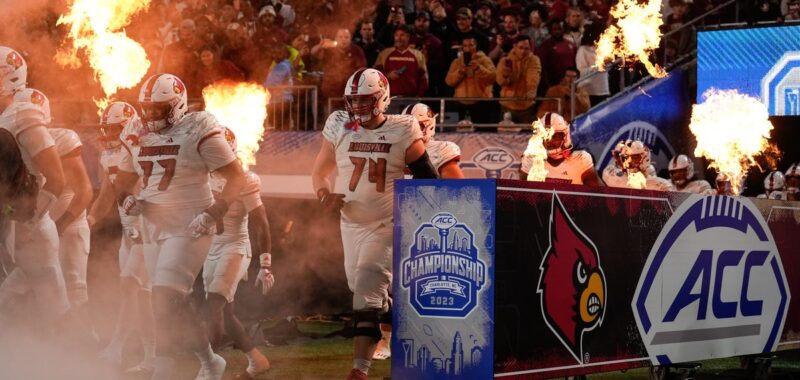AMELIA ISLAND, FL. — After two years of a proverbial dark cloud hanging over ACC spring meetings in sunny Florida, the 2025 session felt lighter.
“I was ecstatic about our meetings,” Commissioner Jim Phillips said Wednesday with a smile. “I just thought it was just a great three days. We were a focused group, and we had a chance to talk about the important areas that are going on in college athletics. And we’ve shed ourselves from some of the things that were difficult to deal with.”
“Things that were difficult to deal with,” meaning the league’s yearslong lawsuits with member schools Clemson and Florida State. They sought a way out of the ACC, suing over “unconscionable” exit fees and the grant of rights agreement. But in March, that all went away, as all three parties agreed to a settlement that would hold the conference together while also allowing both schools to leave and take their media rights with them for a much smaller fee in the future (should they so choose).
Finally, some stability. As a proud member of the ACC for the last decade or so, Louisville and athletics director Josh Heird are happy to leave the lawsuits in the rearview and embark on a new journey.
Still, it feels like a temporary solution. What happens a few years down the road when other power conferences’ TV deals expire and are up for renegotiation? If some of the ACC’s biggest brands leave for greener (as in money) pastures, what does that mean for Louisville? A next man up mentality perhaps?
“I don’t think I view our role as changing a whole lot,” Heird told The Courier Journal. “Because our role is to be as successful as we can be. And, you know, if that success drives us to be put in a little bit more of a more visible role from a leadership standpoint, or whatever it may be, then we’ll try to take advantage of that.”
In January, ESPN exercised its opt-in clause with the ACC, extending their media rights deal through 2036. About two months later, Clemson, Florida State and the conference ended their lawsuits against each other. They agreed to a settlement dramatically reducing exit penalties and altering the league’s revenue-sharing system.
The cost of leaving the ACC will decline by $18 million annually through 2029-30. Then the fee will drop to $75 million, and schools will be able to retain their media rights with the league.
Under the new revenue-sharing model, the ACC will distribute 40% of TV deal money evenly among the league’s 14 most longstanding members — including Clemson, Florida State and Louisville. The other 60% will be distributed based on ratings from the past five years. Basketball and football ratings will be considered, though gridiron viewership will carry more weight, as it’s responsible for about 75% of the league’s TV revenue.
Louisville seems positioned pretty well in that regard behind the league’s biggest football brands in FSU, Clemson, Miami and Bill Belichick-led North Carolina. U of L’s viewership ranked fifth in the ACC during the 2024 and 2021 seasons, according to Medium.com. The Cards were third in 2023 behind the Seminoles and Tigers.
Between football and the other two needle-moving sports — men’s and women’s basketball — Louisville is the only ACC school in every ESPN “way-too-early” preseason poll.
Jeff Walz’s program has been a model of consistency, as he’s led U of L women’s hoops to more regular-season titles and Final Fours than anyone else in the conference. The days of NCAA investigations and scandal are fully behind men’s basketball, as reigning ACC Coach of the Year Pat Kelsey looks to build on last season’s successful campaign with one of the best transfer portal classes in the nation. Football is on the upswing, too, as Jeff Brohm looks to be in position to compete for an ACC title (and possible College Football Playoff appearance) yet again in Year 3.
So, where does that leave Louisville as an athletics program in the next era of this league?
Conference stability, broadly speaking, is beneficial to Louisville for the same reason it’s beneficial to every other member school: one less thing to worry about. As schools juggle NIL, revenue sharing, governmental restructuring and a host of other issues, they don’t have to worry about lawsuits breaking up the league and leaving them stranded.
But how long is the lifespan of this blissful window?
In Phillips’ estimation: three to five years (which, perhaps not so coincidentally, aligns closely with the expiration date of the SEC’s current media rights deal — 2033-34 — and the Big Ten’s – 2029-30).
“I just think you gotta settle down,” Phillips said at ACC spring meetings. “And I think college athletics needs to settle down. Not just the ACC. I think we’ve positioned ourselves for that, and that’s a good thing. It just is. Chaos and the constant wondering of what’s happening here, there, I just think that distracts from the business at hand.
“But I feel good about where we’re at. I still live one day at a time, but I do think that there is a period of time where, let’s settle in, and let’s get some of these things done. Let’s go win and compete for championships, and then see where the future takes us.”
Reach college sports enterprise reporter Payton Titus at ptitus@gannett.com, and follow her on X @petitus25.

